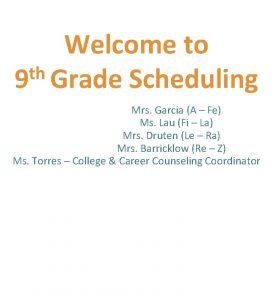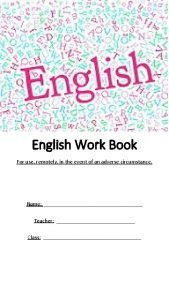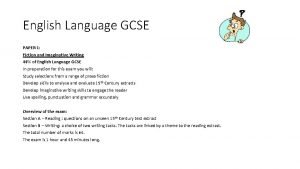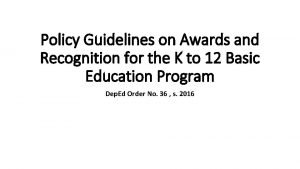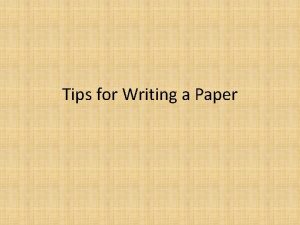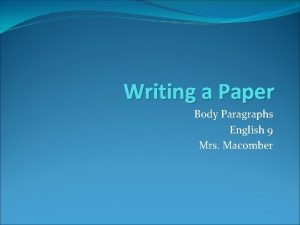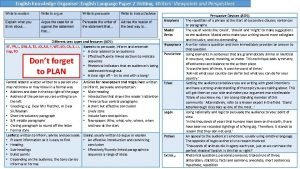Writing the ISearch Paper Honors English 9 Mrs




















- Slides: 20

Writing the I-Search Paper Honors English 9 Mrs. Ivey

What is an I-Search Paper A research-based paper that is written by you where YOU choose the topic and write about it from a personal point of view. It consists of these major parts: ***why I chose my topic ***what I already know ***what I want to find out ***research ***what I learned ***where I can go from here

Selecting a Topic First important aspect…find a topic Brainstorm the following ideas… Finish these statements: I always wanted to know how to ______. I need help with ______. I have always been interested in knowing more about ______. Take an inventory of places you would like to go. Make a list of priorities…included factors that have the greatest impact on your life, including family, health, economics, education, law, and so on. REMEMBER, YOUR GOAL IS TO FIND A TOPIC!!!

Selecting a Topic Things to consider… Does it interest me? ? ? Can it be researched? ? ? OK…so let’s go through this together!

Selecting a Topic I have always wanted to know how to snow ski. I need help with math. I have always been interested in baseball. I would like to learn more about the Holocaust. I would like to visit England. (somewhere you’ve never been before) I would like know more about this person: Elie Wiesel Three more possibilities: World War II, Civil War, Movies

Selecting a Topic Be choosy about your topic… Select something that you know very little about The less you know about the topic…the easier the search will be

Selecting a Topic Use the handout to determine your own topic Here’s a look at my own for some guidance…

Purpose, Audience, Tone Purpose…demonstrate the relevance of the search to YOU! Audience…your classmates and teacher Tone…more informal insomuch as that your are using the narrative form and will write in the first person point of view…should not contain slang or informal English

Evaluate Your Sources You are responsible for determining which sources that you locate are dependable enough to be used as a part of your I-Search Paper Use these questions to help you establish the reliability of your sources:

Evaluating Your Sources Is the information up-to-date? Check many sources to find the most up-to-date information on your subject. Does the information seem factual? Check the information against other sources. If you find a discrepancy, find another source to determine its accuracy. Does the source seem objective and logical? Be sure to find sources that do not have a bias. Be sure that the source uses reasonable arguments and statements about the subject.

Preparing Source Cards Use www. citationmachine. net to prepare your source cards Must have at least four source cards from the following different types of sources: Book Print encyclopedia Alabama Virtual Library source Reliable internet source

Source Card Example 3 AVL Source Smith, Robert. "Western Painting. " Encyclopedia Brittannica. 2004. Web. <http: //search. eb. com>. Page 3

Taking Notes From Your Sources Must take good notes in order to have needed information Three methods to use

Taking Notes From Your Sources Summarizing---(useful passages)—condenses the main points into your own words Reread the passage, writing down a few keywords State the main point IN YOUR OWN WORDS and include the supporting details. Don’t include examples, long details, or explanations Check your summary against the original

Taking Notes From Your Sources Paraphrasing---(key passages)---puts a whole passage into your own words especially when it doesn’t contain memorable language Review the entire passage to get a sense of the meaning of the whole thing, then go back through it sentence by sentence to be sure you get the whole meaning when rewriting it Check your paraphrase to be sure you retain the meaning and tone

Taking Notes From Your Sources Direct Quotations---(crucial phrases, sentences, passages)---quote nuggets only that are wellphrased and authoritative Copy the quotation word for word, enclosing it in quotation marks If you use a quotation, you must see me for how to correctly show credit to the source in your paper

Example of a Notecard Source Card Number & Note Card Number for The Source 1 -1 Elie Wiesel (paraphrase) He won the Nobel Peace Prize in 1986 and was instrumental in the opening of the United States Holocaust Memorial Museum in 1993. Page 25

Writing a Thesis Statement Main idea of your paper Turn your research question into a statement Be sure to add relevant information that your learned in your search

Developing an Informal Outline This will be your guide map to your rough draft DON’T WRITE IN COMPLETE SENTENCES Divide it into three major divisions Story of your search Results of your search Reflections of your search Use this handout to create your informal outline

Create a Rough Draft Use your outline to create a rough draft
 Isearch eduhk
Isearch eduhk Isearch project
Isearch project What i isearch
What i isearch The way my mother speaks carol ann duffy
The way my mother speaks carol ann duffy Golden opulence sundae
Golden opulence sundae Paper 2 aice general paper
Paper 2 aice general paper They are mrs garcia and mrs castro
They are mrs garcia and mrs castro They are mrs garcia and mrs castro
They are mrs garcia and mrs castro Mrs. darling was ___________ of mrs. s.
Mrs. darling was ___________ of mrs. s. Aqa eng lang paper 2
Aqa eng lang paper 2 Fiction extracts for gcse english language
Fiction extracts for gcse english language Selling manhattan carol ann duffy analysis
Selling manhattan carol ann duffy analysis Creighton honors program
Creighton honors program James scholar honors program
James scholar honors program Deped order no. 36, s. 2016
Deped order no. 36, s. 2016 Ucsb honors seminars
Ucsb honors seminars Honors physics semester 1 review
Honors physics semester 1 review Honors biology ecology test
Honors biology ecology test Uncle sam's toolbox assignment answers
Uncle sam's toolbox assignment answers Honors geometry quadrilaterals test
Honors geometry quadrilaterals test Honors earth science
Honors earth science







